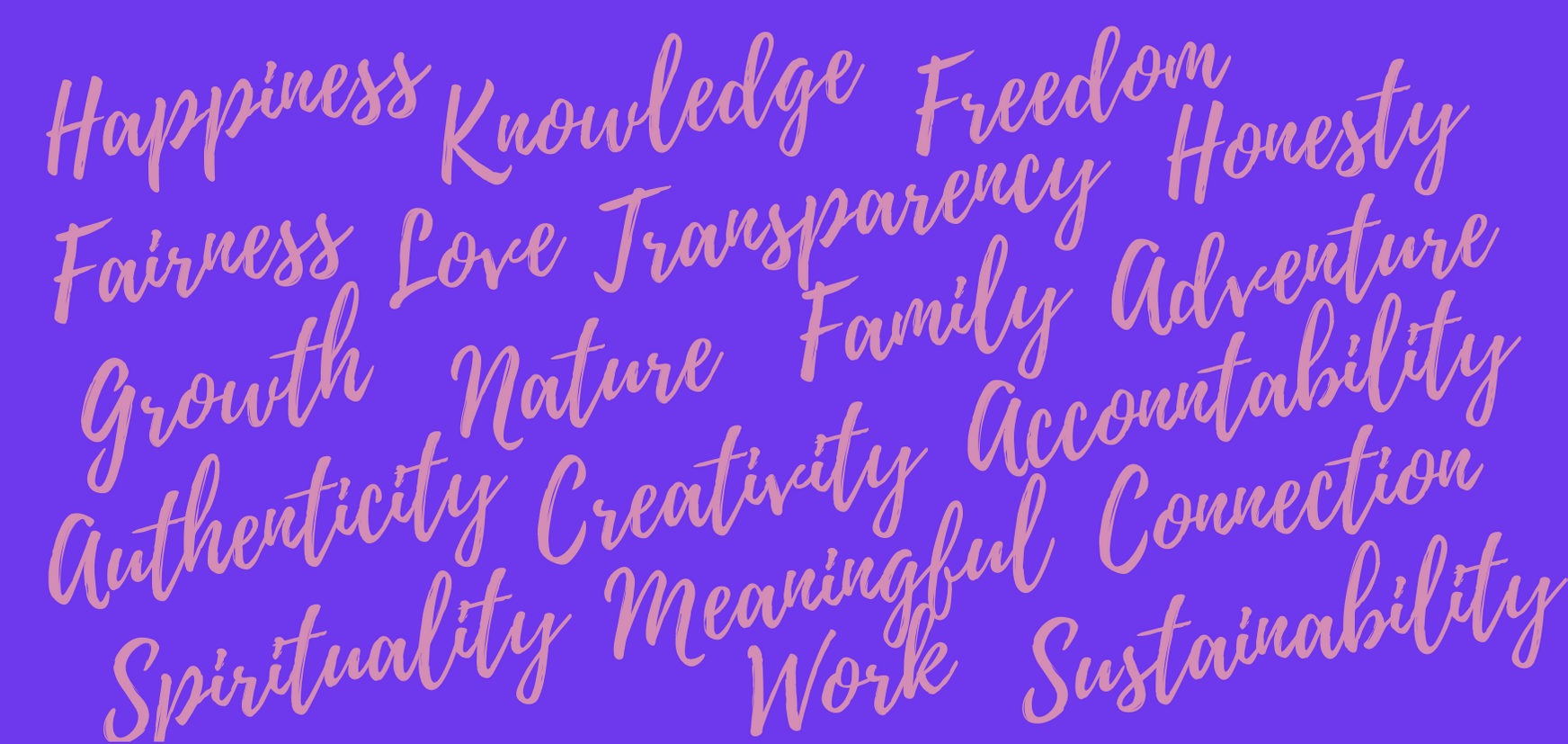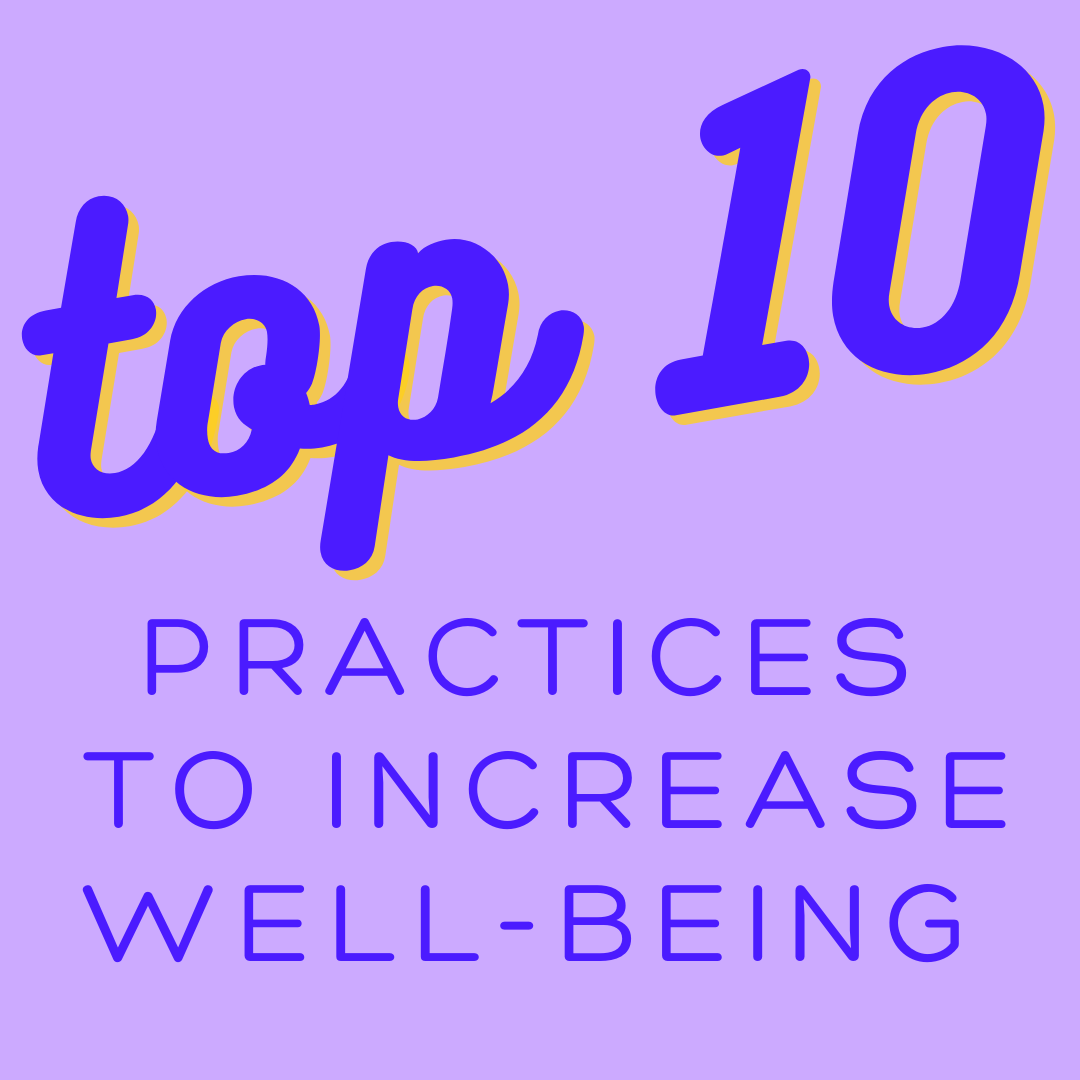Are you looking for a great process to help you feel more happy, fulfilled & aligned? Something to lean on when faced with difficult decisions? Time to define your fundamental values. Values are ideas, concepts and beliefs that help to shape our decisions. They can provide direction, clarity, and sometimes even shortcuts. When our decisions and behaviours are aligned with our values, life feels easy, in flow. Values are always there - at play in our decision-making, and in our lives - even if we are not aware of it. To be able to act with consciousness and awareness, it makes sense to look at them closely, reflect and choose.
"Recognizing your values doesn't change who you are as much as clarify it -helping you to understand yourself better...Values are how we obtain a level of self knowledge that is a platform to achieving success and fulfillment." -Dr Mandeep Rai
After reading a lot of literature and taking both my start up Makerist and my family though this process, I have refined an excellent process for identifying fundamental values. This has helped me understand my motivations, frustrations and to bridge the gap between intuitive knowing and being able to explain to others.
Step 1: Intuitively choose
What instinctively speaks to you? Here is a long list of values, often used in both personal and corporate workshop settings. Read them through, and instinctively note the ones that speak to you. It's ok if it is long for now.
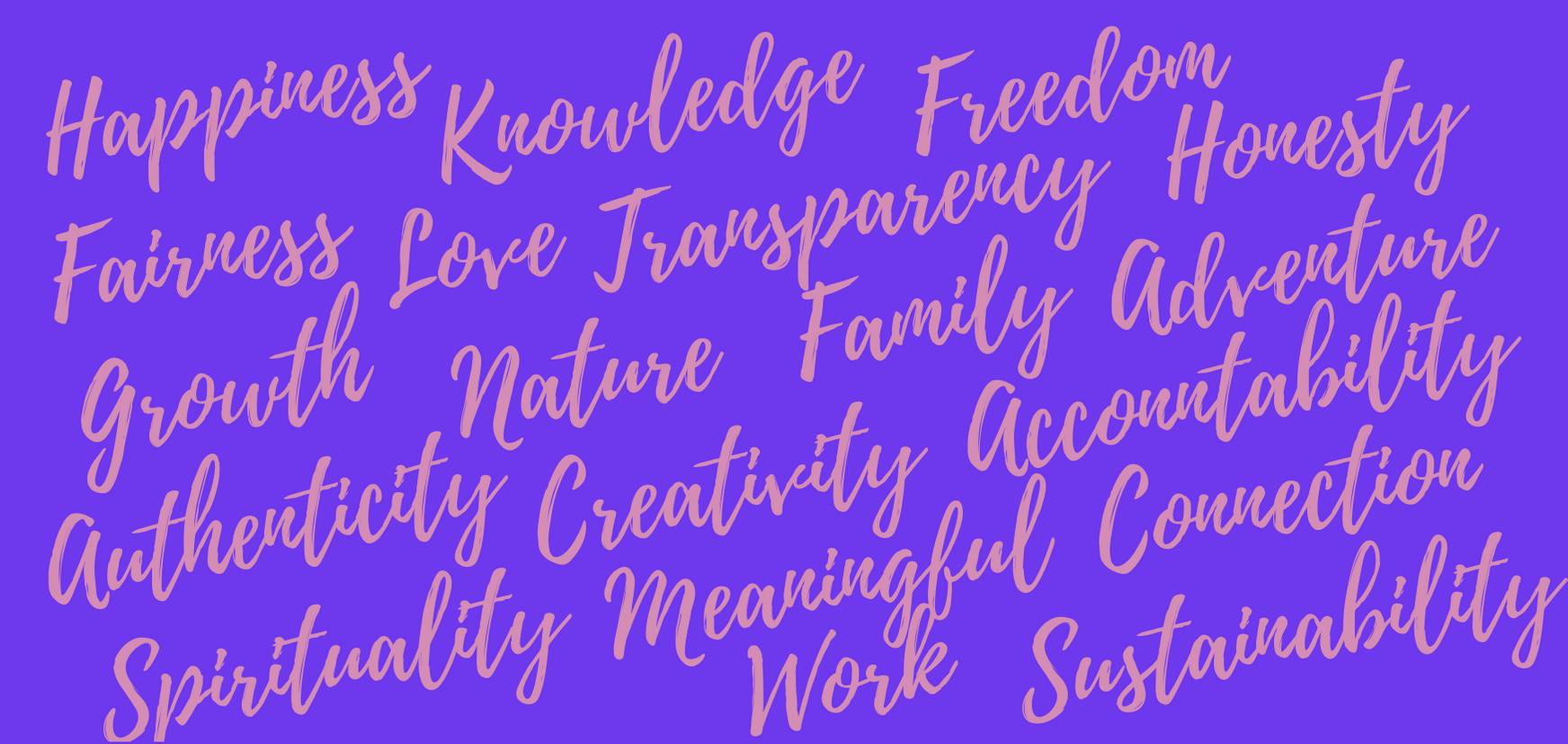
- Accountability
- Achievement
- Adventure
- Authenticity
- Autonomy
- Balance
- Beauty
- Connection
- Compassion
- Citizenship
- Community
- Competency
- Contribution
- Creativity
- Curiosity
- Determination
- Fairness
- Fame
- Freedom
- Friendship
- Fun
- Growth
- Happiness
- Honesty
- Humor
- Justice
- Kindness
- Knowledge
- Leadership
- Learning
- Love
- Loyalty
- Meaningful work
- Nature
- Openness
- Optimism
- Peace
- Pleasure
- Poise
- Recognition
- Respect
- Responsibility
- Security
- Service
- Spirituality
- Stability
- Success
- Sustainability
- Status
- Teamwork
- Tradition
- Transparency
- Trust
- Wealth
- Wisdom
Step 2: Refine & cluster
Narrow your list down, and ask for feedback. From the values you instinctively chose, narrow it down to a short list of five values. See if you can group values into clusters - for example: are transparency and honesty different expressions of the same values? Which best fits your specific experience and belief set?
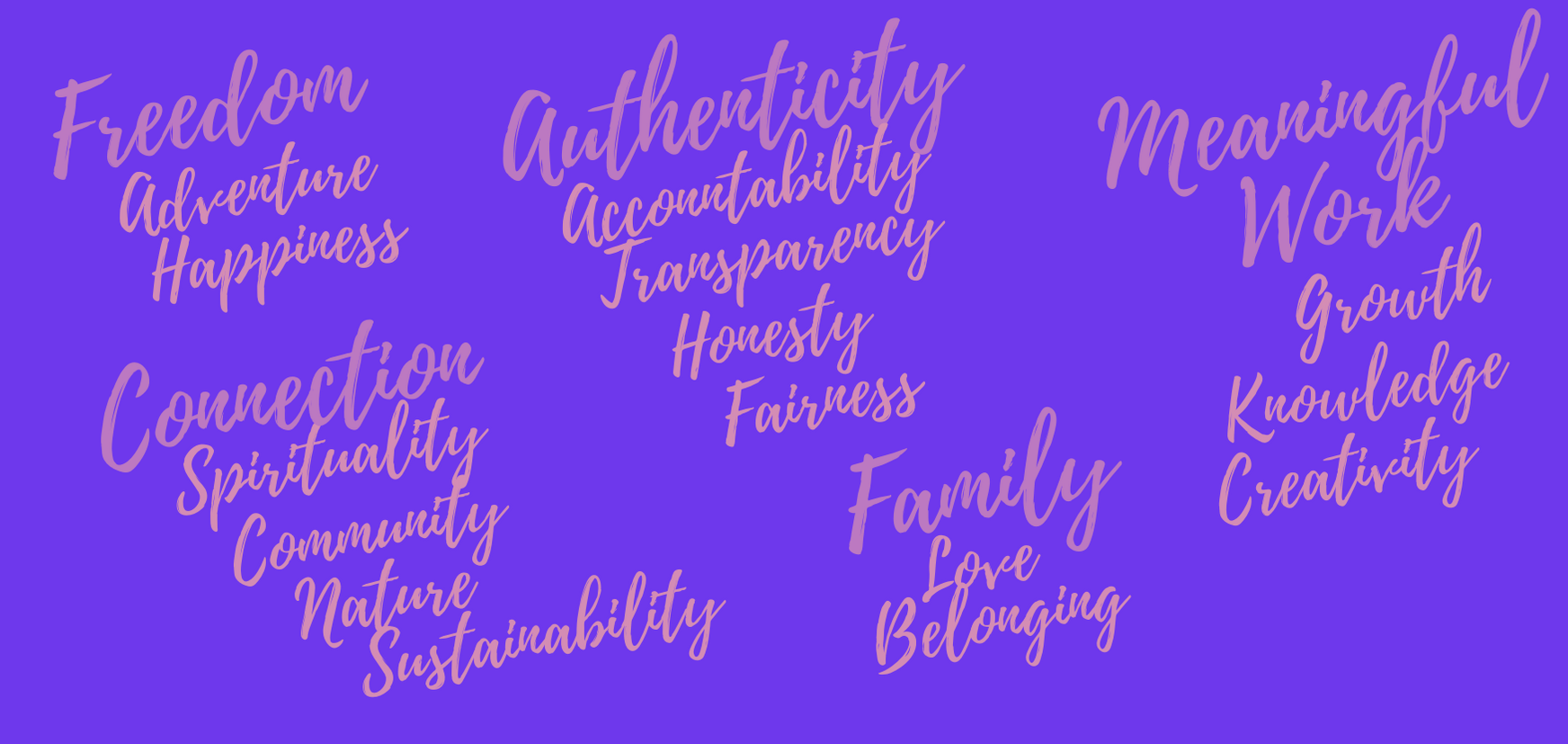
Find a close friend, a member of your family, and a colleague you work with and ask them for their feedback:
- Do you think these values represent who I am?
- Does this reflect how I am showing up for you in our relationship?
- Would you like to give me any feedback or ideas for reflection?
Step 3: Make it aspirational
We are already being controlled by our values, whether we know it or not. When we go about expressing them and making them explicit, we are choosing which values to keep, let go, and to invite in. We can choose different values as adults, than the values we grew up with. We can also choose values to express not just who we are now, but also who we want to be - the best version of ourselves. Values can and should be aspirational - they should be there, motivating us to live to our highest standard of ourselves.

Reflect on the alignment of your values and your current situation - what do you want more of in your life? If connection is a value, but you feel a lack of connection, what could you do to strengthen this feeling in your life? If freedom is a value, but you feel trapped, or locked in - where could you do differently to better express this?
Step 4: Make it personal
Choosing values from a list seems generic. How can we make values as personal and individual as you? Many people probably choose Family as a value, let's take this an an example : there are so many different types of families and different ideas about what family this means - How do you want to express this value in the world?
When I include family as part of my value set - I mean primarily the expression of motherhood to my sons:
- My kids feel safe, supported and encouraged.
- I am the primary caregiver for my children.
- My kids will remember their childhood with happy memories.
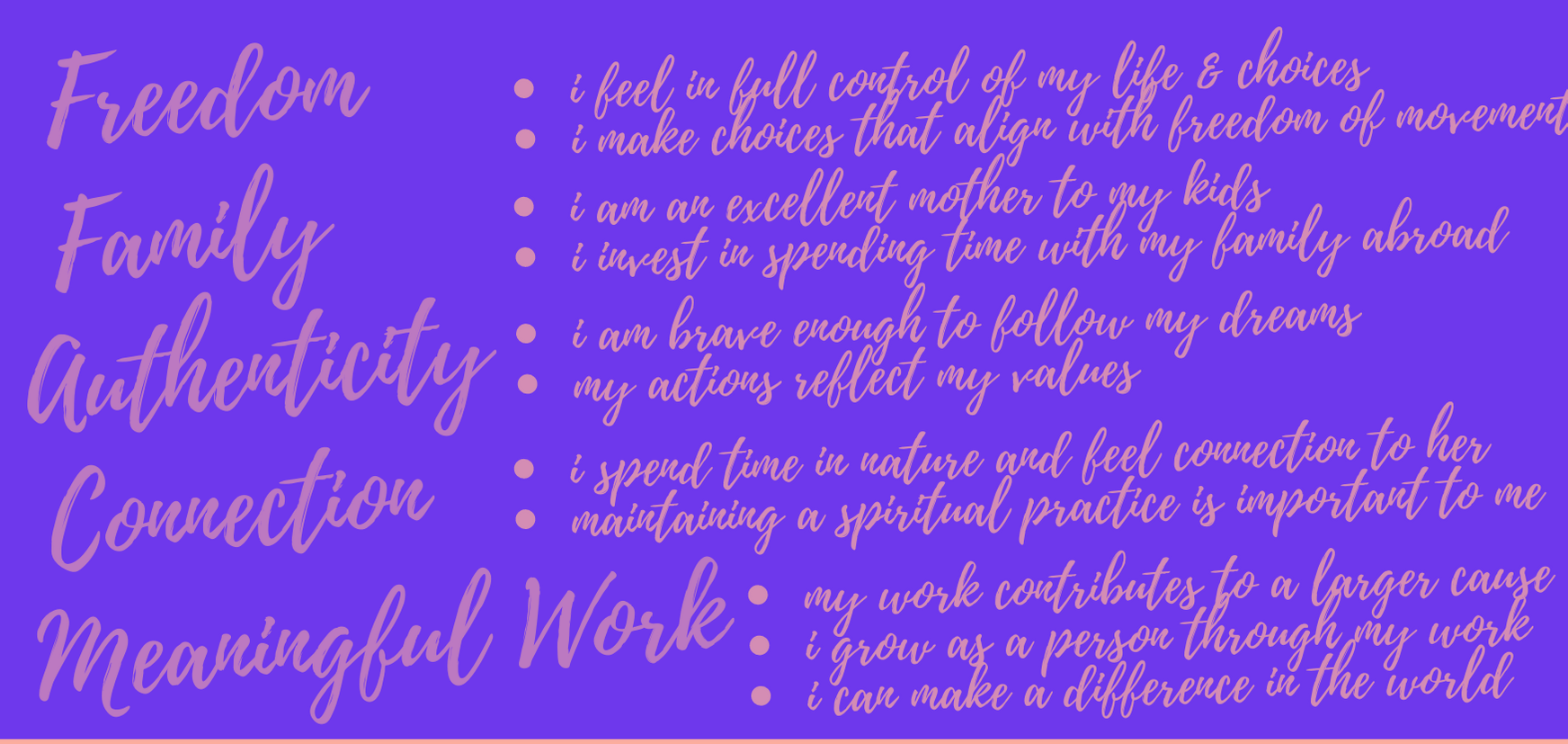
Create some statements around each value that illustrates why it's valuable to you.
Step 5: Prioritize your values

Because values can often be in conflict with one another, it is also important to consciously prioritize. In my personal life, I was often forced to choose between family and work. Growing my start up vs. taking care of sick kids, vs. parent teacher conferences, vs. watching sports games and performances, even between family vacation. As much as possible, I tried to choose both. But - my husband and I were very clear in our discussions around our family - for us, kids and family would always come first.
I generally felt like I was getting on well with both of these key priorities - the marker being : 'When I look back on this period of my kids childhood, will I think - oh god, i missed it?' Until this year when the way I was choosing work started to affect my happiness and my family's harmony at home. I was fulfilling my responsibilities at work, and caring for my children, but I was getting really irritable and taking it out on the people closest to me; yelling at my husband, and being short tempered with my kids. Was this me valuing my family first?
By not choosing and prioritizing one over the other, I did not honour and express these values properly. When forced to choose, I asked myself - what do I need to do to better honour my family? And the answer was, to pull back at work. That does not mean meaningful work was no longer a value for me, but rather, it was currently de-prioritised. This allowed me to communicate with more clarity to my colleagues about why I was pulling back, and gave me the security that it is a temporary situation.
As we as people evolve and our experiences change, values can change too. It is a continual process of prioritizing, changing and adapting. Let us do this as consciously as possible.
Want a sparring partner?
If you are working on creating an explicit set of values for yourself or your company, and want an outside perspective - feel free to reach out.

